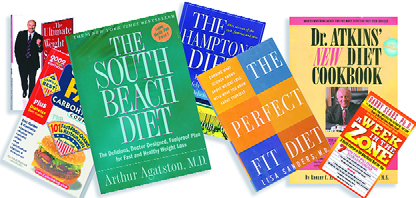Just Weight

This is an unusual edition of “Book Notes.”
Yes, it involves reading a book or two, and those books have had a positive effect on my work as a watershaper, but they’re well off the path of our usual discussions of publications relating to design, construction or business philosophy. Instead, it’s about taking care of our health, both inside and out.
To get the ball rolling, permit me to offer my personal perspective on the sensitive subject of the almighty waistline. I was extremely thin as a kid, could eat absolutely anything I wanted and stayed put with just 120 pounds on my six-foot-tall frame. We’re talking skinny.
As I became older, of course, my metabolism changed and gradually my once-svelte form gave way to a super-sized version of my former self. It happened slowly – so slowly that I never really perceived much change other than the occasional increase in the size of pants I was buying.
It was about two years ago that I finally peaked at a robust 250 pounds. Even then, I wasn’t much aware that I had an issue with my weight until I took a group of kids on a backpacking trip to Colorado. When I came home, my feet were so sore that I literally could not wear shoes for about two weeks. I wondered aloud about what the heck had happened to me when a friend pointed out that, between the 60-pound backpack and the spare luggage around the midsection, I was probably carrying more than 120 extra pounds up and down the mountain trails.
All at once, it dawned on me that I’d gotten fat.
Gaining weight with the passage of time is nothing unusual, of course, and I’d never had occasion to give it much thought – but it took me no time at all to decide that something had to be done, and now. This was where things began to get tricky and challenging: As we all know, old habits of poor diet and deficient exercise die hard. I really had to marshal all my mental and spiritual energy to drop the extra pounds.
This was about the time that many Americans had discovered the Atkins Diet. Lots of people I encountered seemed to be having luck with the program, so I picked up a book and went on the plan. Dr. Atkins’ approach was (and is) controversial, so I want to make it clear that I’m not claiming to be an expert and that I’m neither recommending the Atkins approach or discouraging anyone from following its rules – or anyone else’s rules, for that matter.
In other words, this column isn’t a book review per se, but instead is my personal testimony to the fact that if you feel you are overweight, you can do yourself a world of good by going on some kind of diet and getting into some sort of exercise program. Atkins worked for me, but there are so many others out there that, I believe, the key is to find a program that works for you and just stick with it.
In my case, I’ve dropped 60 pounds – and only then did I fully realize how much the extra weight had been costing me with respect to energy and even mental acuity. The benefits to my personal and professional life have ranged across the board, and it feels wonderful to be able to run, hike and generally make my way through the world unencumbered.
In our work as watershapers, we all know that clients prefer to deal with people they perceive as being in control; it’s also part of our culture (if not human nature) for people to want to work with reasonably attractive people. In the two years since I made this important change, I’ve noticed big differences in the way people respond to me, personally and professionally. Frankly, I think this is a shame, because it is so obviously superficial; having been heavy, I viscerally sympathize with the difficulties we face when we’re heavier than we should be.
For those in our field who do a great deal of the physical labor themselves, there are legitimate issues involved in being fit and healthy enough to manage the workload. But there are greater emotional and physical concerns at stake in weight-related realities that go way beyond the workplace.
If you’re like me and have found yourself at a point where the weight isn’t where you’d like it to be, then I offer the heartfelt thought that doing something about it can yield benefits that go far beyond looking good in jeans.
Mike Farley is a landscape designer with more than 20 years of experience and is currently a designer/project manager for Claffey Pools in Southlake, Texas. A graduate of Genesis 3’s Level I Design School, he holds a degree in landscape architecture from Texas Tech University and has worked as a watershaper in both California and Texas.











